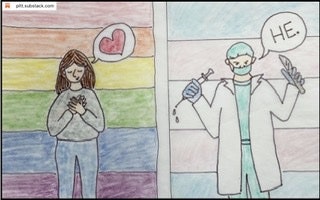When my older daughter was in her early teens, she enjoyed going to Teen Pride events. For a while, she dated girls. She never “came out”, it wasn’t necessary. She knew we didn’t mind whether she dated girls or boys. The only action we had to take was to drive her to her dates. Easy.
My younger daughter, who is in her early teens is a much different situation. She “came out” as transgender at the age of 12 after a lockdown binge on TikTok. As parents, unlike with sexual orientation, we are not supposed to give her space to explore this adolescent phase of her life – in some countries, if we did so, this would be considered “conversion therapy”.
Instead, here is what we are expected to be doing according to the World Professional Organisation for Transgender Health, aka WPATH:
- Call her by a different name, and refer to her as “he” when we talk about her.
On the (terrible) advice of a therapist, we started performing this piece of theatre, but apparently it is insufficient – we are supposed to not just pretend she is a boy, we must also believe that it is true. (As a gender non-conforming woman myself, I believe that the only thing that makes you a woman is a female body. I don’t believe in gender souls.) This social transition has made her miserable.
- Get her on puberty blockers ASAP.
These drugs block the changes that take place during natural puberty. Trans activists say they are a “pause button” and “fully reversible”. In reality they have unknown effects on brain and bones, possible detrimental effects on mental health, and almost all children who take them will move on to cross-sex hormones. We know this because the National Institute for Care Excellence in the UK (NICE) has done an excellent systematic review of the evidence. Puberty blockers are not a pause button that allows you to consider whether you are really trans: they are the first step to a lifetime of chronic medication; they are used off-label because there is no evidence in favour of giving them to distressed teens with normal bodily function; and they have unknown long-term effects.
- Get her on testosterone when she is 14.
At roughly the same age my older daughter was exploring her bisexuality by going for milkshake dates with girls, my youngest is supposed to start getting weekly injections that would give her a beard, deep voice, and clitoral growth; that would have unknown effects on her sexual function; that will make her infertile; and that would lead to vaginal and uterine atrophy within five years.
- Have her breasts amputated when she is 15.
At roughly the same age my oldest started dating a boy, an age when you’re still too young to consent to sex, I’m supposed to take my youngest to hospital to have her healthy breasts removed. As a young teen 30 years ago, I too hated my breasts, in a way that consumed my life at the time. I still find them annoying. But I’ve also fed two babies with them, and they’re great for sex. On balance, the upsides outweigh the downsides. How is a 15-year-old supposed to fully understand this?
- Take her for a hysterectomy aged 17.
My throat constricts when I think about this. I have had a hysterectomy. It was brutal. I nearly died. It changed my body. It took many months to recover. At 17 you are just beginning to find your stride in life. The turmoil of your early teens starts to subside. But how could you settle into yourself if you’ve spent your formative years radically altering your body? By this point she would have been on chronic medication for five years, and it would be her second major surgery. At seventeen, and with a perfectly healthy body.
- Take her for phalloplasty when she’s 18.
Phalloplasty is when they take a piece of your arm or leg, roll it into a tube, and sew it onto the front of your body to simulate a penis. WPATH recommends waiting until you’re 18 because of the high risks of this surgery, which takes place in multiple stages. The main possible complication is incontinence (something that’s also a risk with hysterectomy).
I cannot stress enough that doing all of this is not the same as driving my older daughter to a Teen Pride event. It’s very easy not to be homophobic: the only action required from parents is acceptance. But for me not to be labelled “transphobic”, I have to believe that a series of very poorly-evidenced medical claims are true, and then surrender my perfect child to a brutal regimen of medical and surgical interventions to permanently alter her body. No thank you.
Instead, I will love and support her, help her to explore her identity, and keep her safe. I will celebrate her non-conformity without altering her body. I will keep her from harm.
Originally published at https://pitt.substack.com/p/why-t-is-different-than-lgb-a-parents reproduced by kind permission.

